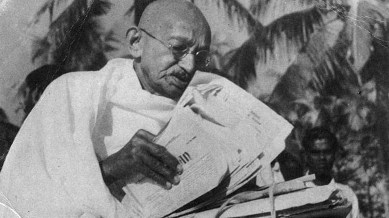📣 For more lifestyle news, click here to join our WhatsApp Channel and also follow us on Instagram
Gandhi Jayanti 2024: The history and significance of Mahatma Gandhi’s favourite bhajan
For Mahatma Gandhi, "Vaishnav Jan To" was more than just a devotional song; it was a reflection of the values he cherished and practiced in his life.

Gandhi Jayanti 2024: Mahatma Gandhi’s beloved bhajan, “Vaishnav Jan To,” a staple of his prayer meetings, was penned by Narsinh Mehta, a poet-philosopher from Gujarat who lived four centuries before Gandhi’s birth.
According to Gandhi’s Song, a 2015 documentary by journalist Mayank Chhaya, the saint’s teachings profoundly influenced the Mahatma. Gandhi adopted “Vaishnav Jan To” as a moral weapon, central to his philosophy of Ahimsa.
monthly limit of free stories.
with an Express account.
“Over four centuries after he wrote it, the song became Mohandas Gandhi’s lifelong moral compass and directly influenced India’s great freedom campaign against British imperial rule. What is remarkable about ‘Vaishnav Jan’, something that Gandhi understood and imbibed, is that the song is a remarkably secular and non-denominational benchmark for righteous human conduct,” Chhaya writes on his website.
Know about the bhajan and Gandhi’s connection to it
The bhajan, originally composed in the Gujarati language, is an ode to the virtues of a Vaishnav (a devotee of Lord Vishnu) and defines what it means to live a life of selflessness, humility, and empathy.
American scholar of Hinduism Vasudha Narayanan explained in The Wiley Blackwell Companion to Religion and Materiality, the bhajan exemplifies the concept of jiva-daya, a form of ahimsa that involves empathising with the suffering of others and connecting it to bhakti, devotion to God.
For Gandhi, “Vaishnav Jan To” was more than just a devotional song; it was a reflection of the values he cherished and practiced in his life. The bhajan encapsulated the principles of Satyagraha (non-violent resistance) and Sarvodaya (the welfare of all), ideals that shaped his mission for India’s independence. Gandhi’s advocacy for truth, non-violence, and his emphasis on social justice found resonance in this hymn’s call for compassion and humility.
Influence on the Indian Freedom Movement
During India’s struggle for independence, the song became emblematic of the spiritual and moral ethos that guided the movement. It was frequently sung at gatherings and prayer meetings, reinforcing the idea that personal virtue and public service were inextricably linked. The hymn’s message of humility and serving others without expectation of reward became central to Gandhi’s teachings.
“Vaishnav Jan To” continues to inspire people across the world. Numerous artists, including famous Indian singers like Lata Mangeshkar, Pandit Jasraj, and even global musicians, have performed renditions of this iconic bhajan. On the occasion of Gandhi’s 150th birth anniversary in 2019, artists from over 124 countries came together to sing this hymn as a tribute to Gandhi’s lasting legacy.
📣 For more lifestyle news, click here to join our WhatsApp Channel and also follow us on Instagram